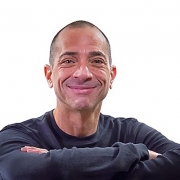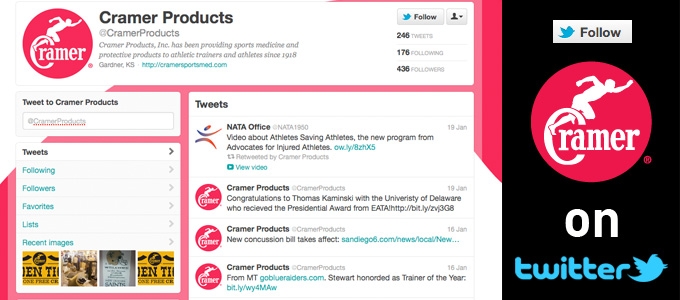Athletic Trainer Profile: Sandy Krum, ATC
It goes without saying that every athletic trainer hopes to work with a winning team. But for the past eight years, Sandy Krum, ATC, has helped one loser after another—more than 300 of them—and he couldn’t be more delighted.
“In 2007,” Sandy explains, “I was offered the opportunity to be the head athletic trainer and set medic for NBC’s hit series, The Biggest Loser. I’d been with the Cubs for three years and wondered how I would go from working with the best athletes to treating the obese, but I was up to the challenge and headed to L.A.”
Athletic trainer for a TV show was definitely not a role Sandy could have predicted when he fell in love with athletic training at age 11. “I was the visiting club bat boy at Wrigley Field and witnessed every athletic trainer for the National League who came to the stadium. I observed the entire process of getting players ready for the game and treating them during the game, and knew this is what I wanted to do,” he says.
Sandy can’t say enough about how much he loved attending Cramer Camps during high school in the late ‘70s and early ‘80s. Like many athletic trainers of certain generations, he still values the education and experience the camps offered. He graduated from high school in 1982, and then attended Ohio University. “Right out of college,” he says, “Larry Starr hired me to work for the Cincinnati Reds in the summer of 1986. I definitely started at the bottom. Every day I drove the van and picked up the players; taped, stretched and iced them, then drove them home.”
In 1990, Sandy went to work for the Pittsburgh Pirates’ A team in Salem, Va., under Kent Biggerstaff. He worked his way up the Pirates organization and was named Minor League Athletic Trainer of the Year along the way in 1994 and 1998. After 10 years with the Pirates, Sandy took the position of assistant athletic trainer for four years with his beloved Chicago Cubs, working with David Tumbas.
All of his experience leading up to The Biggest Loser provided Sandy with an approach that worked well with those selected to compete on the weight loss show. “I treated them as athletes,” he says. “I showed them that they are athletes, and helped each of them find their ‘inner athlete.’ This philosophy worked well throughout my 11 seasons with the show, and I’m proud to say that I have strong fans among many of the former contestants. They trusted my opinion and could tell I genuinely wanted to help them and still do to this day. I regularly email, talk with, and Skype with quite a few of them, and am happy to be there to support them.”
According to Sandy, The Biggest Loser concept has been adopted by television stations in 90 countries on six continents, and many of them follow the medical protocol he established and wrote. “It’s important to have a specific plan when helping very obese people lose weight,” he explains. “Each contestant must be supported by a team composed of a physician, nutritionist, psychiatrist or psychologist, and athletic trainer. Lab tests are critically important. Many participants arrive with a shopping bag full of medication and we have to understand when they can get off of them and how to do that safely. We often deal with sleep apnea and dehydration. Calorie intake and exercise are a big part of it, of course, but there’s so much more. The psychological and emotional aspects of being overweight, and learning to value one’s self, need more attention than almost anything.” Sandy is writing a book about getting on the road to health, based on his knowledge and experiences from the show.
Another goal of Sandy’s is to increase the number of student athletes that have access to care from an athletic trainer. “One-third of schools in the U.S. don’t use athletic trainers. So if one of these children is injured, it’s up to his or her parents to see what’s going on with their child and determine how to treat them and whether or not they should return to play. Every athlete at any age deserves the care of an athletic trainer, and I’m doing all I can to get the word out about this.”
Being a mentor to young athletic trainers is another passion Sandy has. “I encourage every experienced athletic trainer to share their experience and love of our profession with young people new to the field, or who are considering this career. We all have to give back and provide direction and mentorship to the athletic trainers who will be taking our places. I wouldn’t trade this career for anything, and wouldn’t be where I am today without the many mentors who guided me. There’s nothing more rewarding than playing that role in the lives of younger professionals.”
Learn more about Sandy by visiting his website, www.sandykrum.com.


